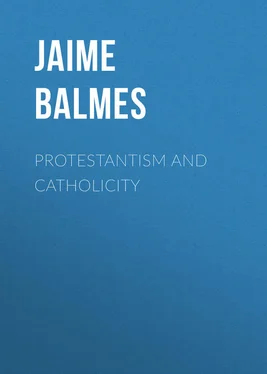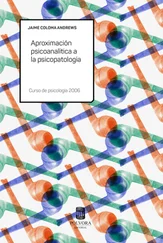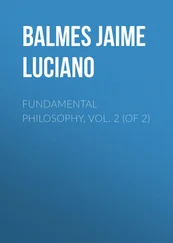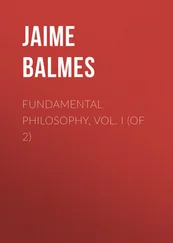Jaime Balmes - Protestantism and Catholicity
Здесь есть возможность читать онлайн «Jaime Balmes - Protestantism and Catholicity» — ознакомительный отрывок электронной книги совершенно бесплатно, а после прочтения отрывка купить полную версию. В некоторых случаях можно слушать аудио, скачать через торрент в формате fb2 и присутствует краткое содержание. Жанр: foreign_antique, foreign_prose, на английском языке. Описание произведения, (предисловие) а так же отзывы посетителей доступны на портале библиотеки ЛибКат.
- Название:Protestantism and Catholicity
- Автор:
- Жанр:
- Год:неизвестен
- ISBN:нет данных
- Рейтинг книги:3 / 5. Голосов: 1
-
Избранное:Добавить в избранное
- Отзывы:
-
Ваша оценка:
- 60
- 1
- 2
- 3
- 4
- 5
Protestantism and Catholicity: краткое содержание, описание и аннотация
Предлагаем к чтению аннотацию, описание, краткое содержание или предисловие (зависит от того, что написал сам автор книги «Protestantism and Catholicity»). Если вы не нашли необходимую информацию о книге — напишите в комментариях, мы постараемся отыскать её.
Protestantism and Catholicity — читать онлайн ознакомительный отрывок
Ниже представлен текст книги, разбитый по страницам. Система сохранения места последней прочитанной страницы, позволяет с удобством читать онлайн бесплатно книгу «Protestantism and Catholicity», без необходимости каждый раз заново искать на чём Вы остановились. Поставьте закладку, и сможете в любой момент перейти на страницу, на которой закончили чтение.
Интервал:
Закладка:
Did a more formal condemnation of the Reformation ever issue out of the mouth of man? could any thing of the kind ever be said of the sects of philosophers, ancient or modern? Can the Reformation, then, after this, pretend to direct men or society? "Thence arises," continues M. Guizot, "a certain air of inconsistency and narrowness of spirit, which has often given advantages over it to its opponents. The latter knew very well what they did and what they wished; they ascended to the principles of their conduct, and avowed all their consequences. There never was a government more consistent, more systematic than that of the Church of Rome." But whence was the origin of a system so consistent? When we consider the fickleness and inconstancy of the human mind, do not this system, this consistency, and these fixed principles, speak volumes to the philosopher and man of good sense?
We have observed those terrible elements of dissolution which have their source in the mind of man, and which have acquired so much force in modern society; we have seen with what fatal power they destroy and annihilate all institutions, social, political, and religious, without ever succeeding in making a breach in the doctrines of Catholicity, – without altering that system, so fixed and so consistent. Is there no conclusion to be drawn from all this in favour of Catholicity? To say that the Church has done that which no schools, or governments, or societies, or religions could do, is it not to confess that she is wiser than every thing human? And does it not clearly prove that she does not owe her origin to human thought, and that she is derived from the bosom of the Creator? This society – formed, you say, by men – this government, directed by men, has endured for eighteen hundred years; it extends to all countries, it addresses the savage in the forest, the barbarian in his tent, the civilized man in the most populous cities; it reckons among its children the shepherd clothed in skins, the laborer, the powerful nobleman; it makes its laws heard alike by the simple mechanic at his work, and the man of learning in his closet absorbed in the profoundest speculations. This government has always had, according to M. Guizot, a full knowledge of its actions and its wishes; it has always been consistent in its conduct. Is not this avowal its most convincing apology, its most eloquent panegyric; and shall it not be considered a proof that it contains within itself something more than human?
A thousand times have I beheld this prodigy with astonishment; a thousand times have my eyes been fixed upon that immense tree which extends its branches from east to west, from north to south; I see beneath its shade a multitude of different nations, and the restless genius of man reposing in tranquillity at its feet.
In the East, at the period when this divine religion first appeared, I see, amidst the dissolutions of all sects, the most illustrious philosophers crowd to hear her words. In Greece, in Asia, on the banks of the Nile, in all the countries where, a short time before, swarmed innumerable sects, I see appear on a sudden a generation of great men, abounding in learning, in knowledge, in eloquence, and all agreeing in the unity of Catholic doctrine.
In the West, a multitude of barbarians throw themselves on an empire falling to decay; a dark cloud descends upon an horizon charged with calamities and disasters; there, in the midst of a people submerged in the corruption of morals, and having lost even the remembrance of their ancient grandeur, I see the only men who can be called worthy heirs of the Roman name, seek, in the retirement of their temples, an asylum for the austerity of their morals; it is there that they preserve, increase, and enrich the treasure of ancient knowledge. But my admiration reaches its height, when I observe that sublime intellect, worthy heir of the genius of Plato, which, after having sought the truth in all the schools, in all the sects, and with indomitable boldness run through all human errors, feels itself subjugated by the authority of the Church, and transforms the freethinker into the great Bishop of Hippo. In modern times the series of great men who shone in the times of Leo X. and Louis XIV. passes before my eyes. I see the illustrious race still continue throughout the calamities of the eighteenth century; and in the nineteenth I see fresh heroes, who, after having followed error in all directions, come to hang their trophies at the gates of the Catholic Church. What, then, is this prodigy? Has a sect or religion like it ever before been seen? These men study every thing, dispute on every thing, reply to every thing, know every thing; but always agreeing in unity of doctrine, they bend their noble and intellectual brows in respectful obedience to faith. Do we not seem to behold another planetary system, where globes of fire revolve in their vast orbits in the midst of immensity, always drawn to their centre by a mysterious attraction? That central force, which allows no aberration, takes from them nothing of their extent, or of the grandeur of their movement; but it inundates them with light, while giving to their motion a more majestic regularity. 6 Конец ознакомительного фрагмента. Текст предоставлен ООО «ЛитРес». Прочитайте эту книгу целиком, купив полную легальную версию на ЛитРес. Безопасно оплатить книгу можно банковской картой Visa, MasterCard, Maestro, со счета мобильного телефона, с платежного терминала, в салоне МТС или Связной, через PayPal, WebMoney, Яндекс.Деньги, QIWI Кошелек, бонусными картами или другим удобным Вам способом.
CHAPTER IV.
PROTESTANTISM AND THE MIND
This fixedness of idea, this unanimity of will, this wisdom and constancy of plan, this progress with a firm step towards a definite object and end; and, in fine, this admirable unity, acknowledged in favor of Catholicism by M. Guizot himself, have not been imitated by Protestantism, either in good or evil. Protestantism, indeed, has not a single idea, of which it can say: "This is my own." It has attempted to appropriate to itself the principle of private judgment in matters of faith; and if several of its opponents have been too willing to accord it, it was because they were unable to find therein any other constitutive element; it was also because they felt that Protestantism, in boasting of having given birth to such a principle, labored to throw disgrace on itself, like a father who boasts of having unworthy and depraved sons. It is false, however, that Protestantism produced this principle of private judgment, since it was itself the offspring of that principle. That principle, before the Reformation, was formed in the bosom of all sects; it is the real germ of all errors; in proclaiming it, Protestants only yielded to a necessity which is common to all the sects separated from the Church.
There was therein no plan, no foresight, no system. The mere resistance to the authority of the Church included the necessity of unlimited private judgment, and the establishment of the understanding as supreme judge; even had the coryphæi of Protestantism wished from the first to oppose the consequences and applications of this right, the barrier was broken, and the torrent could not have been confined.
"The right of examining what we ought to believe," says a celebrated Protestant, ( Germany , by Mad. de Staël, part iv. chap. 2), "is the foundation of Protestantism. The first Reformers did not think thus; they thought themselves able to place the pillars of Hercules of the mind according to their own lights; but they were mistaken in hoping to make those who had rejected all authority of this kind in the Catholic religion submit to their decisions as infallible." This resistance on their part proves, that they were not led by any of those ideas, which, although erroneous, show, in some measure, nobleness and generosity of heart; and that it is not of them that the human mind can say: "They have erred, but it was in order to give me more liberty of action." "The religious revolution of the sixteenth century," says M. Guizot, "did not understand the true principles of intellectual liberty; it liberated the human mind, and yet pretended to govern it by law."
Читать дальшеИнтервал:
Закладка:
Похожие книги на «Protestantism and Catholicity»
Представляем Вашему вниманию похожие книги на «Protestantism and Catholicity» списком для выбора. Мы отобрали схожую по названию и смыслу литературу в надежде предоставить читателям больше вариантов отыскать новые, интересные, ещё непрочитанные произведения.
Обсуждение, отзывы о книге «Protestantism and Catholicity» и просто собственные мнения читателей. Оставьте ваши комментарии, напишите, что Вы думаете о произведении, его смысле или главных героях. Укажите что конкретно понравилось, а что нет, и почему Вы так считаете.












